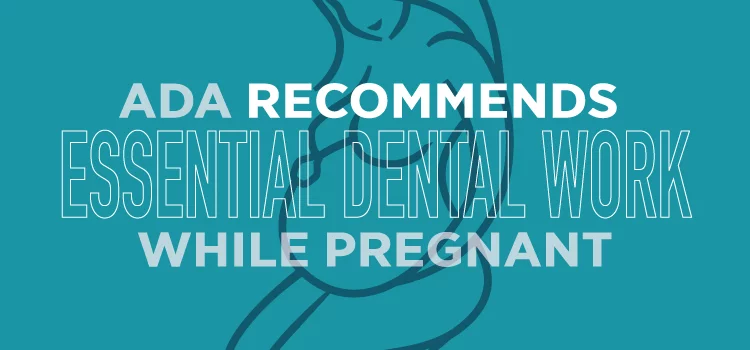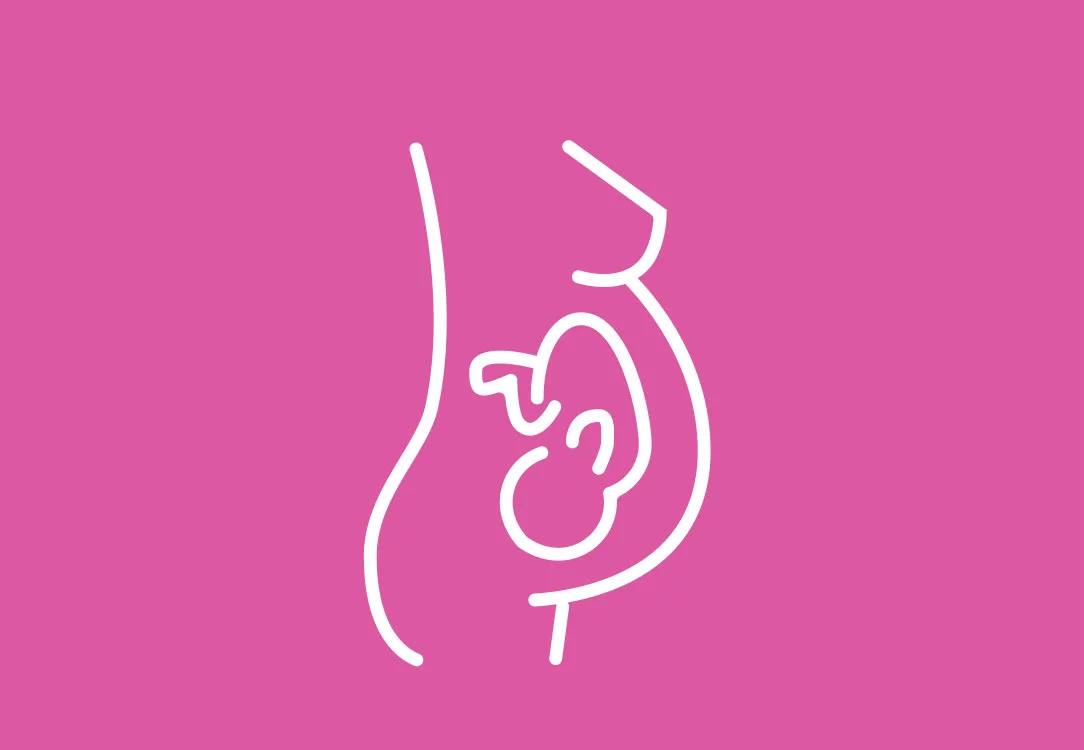These changes in your hormones will impact your oral health during pregnancy, from toothaches during pregnancy to bad breath and sore gums. In this article, we explore what you can expect to happen with your oral health during pregnancy, how you can manage it with your home care, and what you should and shouldn't do at the dentist while you are expecting.
Why Are My Teeth Sensitive During My Pregnancy?
Key Things to Know:
Hormones & Habits Trigger Sensitivity – Increased blood flow, dry mouth, inflammation, diet changes, stress, and morning sickness can cause tooth pain.
Sensitivity Usually Fades After Birth – Most cases resolve on their own post-pregnancy.
Simple Care Can Help – Avoid acidic foods, use a straw, stay hydrated, manage stress, and rinse after vomiting.
Many women experience teeth sensitivity during their pregnancy. Experts attribute this toothache during pregnancy to several factors, including changes in hormones and disruptions to home care routines. Some other possible contributing factors for tooth pain during pregnancy are:[i]
- Increased blood flow to the gums
- Decreased saliva production due to hormone changes, resulting in dry mouth
- Heightened inflammatory responses to gums because of hormone fluctuations
- Changes to diet because of pregnancy cravings
- Grinding teeth because of stress
- Morning sickness symptoms (aka, barfing)
Most women’s teeth sensitivity during pregnancy will go away after the baby is born, requiring no further treatment. However, you can do a few things to alleviate the symptoms of sensitive teeth during pregnancy while you have them.
- Limiting sugary or acidic foods or drinks is an excellent place to start.
- Drinking through a straw can help avoid temperature sensitivity responses.
- Managing stress levels is vital to prevent reactions like grinding your teeth.
- You should drink lots of water to keep your mouth hydrated, which can help prevent bad breath associated with pregnancy.
- Desensitizing toothpaste might help with sensitive teeth during pregnancy, too; just be sure it has fluoride to protect your teeth from decay.
- If you are unfortunate enough to vomit a lot during pregnancy, be sure to rinse your mouth with water afterward to get the stomach acids off your teeth and wait for around 30 minutes before you brush to preserve your enamel.[ii]
Of course, if you are experiencing lots of discomfort, it's always a good idea to see your dental team find out how to reduce teeth sensitivity during pregnancy safely.
Feeling Dental Pain? Book A Dental Appointment
Why Are My Gums Bleeding During My Pregnancy?
Key Things to Know:
Gum disease is common – Up to 75% of pregnant women experience it.
Possible risks – Linked to preterm birth and low birth weight.
Prevention helps – Brushing, flossing, mouthwash, and vitamin C can reduce symptoms.
Bleeding gums during pregnancy are common, as many pregnant women develop gum disease, also called periodontal disease. Research shows that as many as 40 percent of pregnant women have some form of it. [3] However, the CDC estimates for pregnant women with gum disease are much higher at 60 to 75 percent.[iii]
Gum disease has two stages: gingivitis and periodontitis. Gingivitis is an inflammatory condition where the gums are swollen and bleed in response to dental plaque. Periodontitis is also an inflammatory response to dental plaque. However, as a more advanced form of gum disease, periodontitis destroys the gums and supporting bones. Untreated periodontitis can also lead to tooth loss.[iv]
Untreated gum disease has negative effects on your pregnancy. Since the late 90s, studies have indicated an association between a mother's periodontal disease and preterm births and low birth weight. It is important to note that there is no evidence that gum disease causes preterm labor, which sometimes could result in miscarriage, but a 2017 study indicates that gum disease is a risk indicator for adverse pregnancy outcomes.[v] Therefore, medical and dental experts agree that pregnant women with gum disease should seek care. Gum disease treatment does not harm the pregnancy, reduces the levels of inflammation in the body, and improves the mother's oral health.[vi]
Why Are My Gums Swollen During My Pregnancy?
Key Things to Know:
Hormone fluctuations increase blood flow, making gums more sensitive and swollen.
Progesterone weakens your defense against plaque, raising gingivitis risk.
Dry mouth, diet changes, and morning sickness can worsen gum irritation.
It will probably come as no surprise that you have swollen gums during pregnancy because of hormone changes. These fluctuations between estrogen and progesterone, the female sex hormones, cause an increase in blood flow to your gums. This increase in flow causes pregnancy gums to be sensitive, irritated, and swollen.[xii]
However, your hormones have other indirect causes of your swollen gums during pregnancy. The changing progesterone levels thwart your body's natural response to bacteria, including the plaque on your teeth. As the plaque builds up on the teeth, your gums are at a higher risk for developing gingivitis, which causes red, swollen gums. [xiii]
There are a few other possible causes of sore gums during pregnancy. WhattoExpect.com suggests that dry mouth and changes in eating habits can contribute to an increase in plaque buildup. Also, your gums might be reacting to the acid present in vomit from morning sickness. Changes in your home care habits don't help with plaque levels either.[xiv]

Is It Safe to Go to the Dentist When Pregnant?
Key Things to Know:
Dental visits are safe and recommended during pregnancy, especially for treating pain or gum issues.
X-rays and anesthesia are okay with proper precautions like protective aprons.
Best time for treatment is the second trimester; avoid elective procedures like teeth whitening.
The ADA says you can go to the dentist while pregnant. Not only that, but the ADA also recommends getting essential dental work while pregnant, especially women who have Pregnancy Gingivitis or tooth pain while pregnant, which could need treatment by a dental professional.[xv] The American Congress of Obstetricians and Gynecologists (ACOG) agree about pregnancy and dental work, adding that health care providers should assess women's oral health and encourage their patients to see the dentist while pregnant. [xvi] Also, both medical and dental professionals think dental visits can reassure women about the changes they might notice in their mouths and teeth during pregnancy and are an excellent opportunity to reinforce the importance of good home care.[xvii]
How to be Proactive about Your Oral Health During Pregnancy
- Brushing twice a day for at least two minutes
- Flossing or cleaning between teeth daily
- Using a fluoride mouth rinse daily
What Pregnancy Tooth Sensitivity Solutions Can You Do At Home?
- Using a baking soda solution for brushing to neutralize acids in the mouth.
- Rubbing Aloe Vera on swollen gums to reduce swelling and bacterial growth
- Drinking milk to get more Calcium and Vitamin K in your system helps with gum health.
- Rinsing with sugar-free pomegranate juice to prevent plaque and bacterial buildups in the mouth
- Applying garlic or clove to the affected area; garlic is a natural antibiotic, and clove is a natural antiseptic
Find a Dentist
Pregnancy is an exciting time in your life and brings with it a lot of change, from how TV commercials make you cry now to what you want to eat at 10 pm on a Wednesday. Pregnancy also means changes to your teeth and gums. Be sure to go to the dentist while pregnant and talk about any concerns you have about sore, bleeding gums, and tooth pain while pregnant. If you need any help finding a dentist, use your find a dentist tool, we have a tool that helps find a trusted dentist in your area. Following the dental guidelines for pregnant patients, your dental team can address what you need to know about pregnancy and dental work, and what else you can expect to change with your oral health while you are expecting.
Find your trusted, local dentist today!
Sources
[i] Sensitive Teeth During Pregnancy: What To Expect And How To Cope. Colgate.com. https://www.colgate.com/en-us/oral-health/oral-care-during-pregnancy/sensitive-teeth-during-pregnancy-what-to-expect-and-how-to-cope. Accessed April 08, 2025.
[ii] Sensitive Teeth During Pregnancy: What To Expect And How To Cope. Colgate.com. https://www.colgate.com/en-us/oral-health/oral-care-during-pregnancy/sensitive-teeth-during-pregnancy-what-to-expect-and-how-to-cope. Accessed April 08, 2025.
[iii] Pregnancy and Oral Health – Centers for Disease Control. Cdc.gov. https://www.cdc.gov/oral-health/hcp/conversation-tips/talking-to-pregnant-women-about-oral-health.html. Accessed April 08, 2025.
[iv] Gum Disease Information - American Academy of Periodontology. Perio.org. https://www.perio.org/for-patients/gum-disease-information/. Accessed April 08, 2025.
[v] Turton M, Africa CWJ. Further evidence for periodontal disease as a risk indicator for adverse pregnancy outcomes. Int Dent J. 2017;67(3):148-156. doi:10.1111/idj.12274
[vi] Committee Opinion: Oral Health Care During Pregnancy and Through The Lifespan. Acog.org. https://www.acog.org/-/media/project/acog/acogorg/clinical/files/committee-opinion/articles/2013/08/oral-health-care-during-pregnancy-and-through-the-lifespan.pdf. Published 2013. Accessed April 08, 2025.
[vii] Women's Hormones and Dental Health - American Dental Association. Mouthhealthy.org. https://www.mouthhealthy.org/all-topics-a-z/womens-hormones-and-dental-health. Accessed April 08, 2025.
[viii] Marcin A. Pregnancy Gingivitis: Prevention and Treatment. Healthline.com. https://www.healthline.com/health/pregnancy/gingivitis#what-is-it. Published 2016. Accessed April 08, 2025.
[ix] Committee Opinion: Oral Health Care During Pregnancy and Through The Lifespan. Acog.org. https://www.acog.org/-/media/project/acog/acogorg/clinical/files/committee-opinion/articles/2013/08/oral-health-care-during-pregnancy-and-through-the-lifespan.pdf. Published 2013. Accessed April 08, 2025.
[x] Women's Hormones and Dental Health - American Dental Association. Mouthhealthy.org. https://www.mouthhealthy.org/all-topics-a-z/womens-hormones-and-dental-health. Accessed April 08, 2025.
[xi] O'Connor A. Bleeding Gums and Sore Mouth During Pregnancy. What to Expect. https://www.whattoexpect.com/pregnancy/symptoms-and-solutions/gums-bleeding-sore.aspx. Published 2022. Accessed April 08, 2025.
[xii] Swollen Gums During Pregnancy. americanpregnancy.org. https://americanpregnancy.org/healthy-pregnancy/is-it-safe/swollen-gums-during-pregnancy/. Published 2021. Accessed April 08, 2025.
[xiii] Swollen Gums During Pregnancy. americanpregnancy.org. https://americanpregnancy.org/healthy-pregnancy/is-it-safe/swollen-gums-during-pregnancy/. Published 2021. Accessed April 08, 2025.
[xiv] O'Connor A. Bleeding Gums and Sore Mouth During Pregnancy. What to Expect. https://www.whattoexpect.com/pregnancy/symptoms-and-solutions/gums-bleeding-sore.aspx. Published 2022. Accessed April 08, 2025.
[xv] Pregnancy and Your Dental Health - American Dental Association. Mouthhealthy.org. Accessed April 08, 2025.
[xvi] Committee Opinion: Oral Health Care During Pregnancy and Through The Lifespan. Acog.org. https://www.acog.org/-/media/project/acog/acogorg/clinical/files/committee-opinion/articles/2013/08/oral-health-care-during-pregnancy-and-through-the-lifespan.pdf. Published 2013. Accessed April 08, 2025.
[xvii] Committee Opinion: Oral Health Care During Pregnancy and Through The Lifespan. Acog.org. https://www.acog.org/-/media/project/acog/acogorg/clinical/files/committee-opinion/articles/2013/08/oral-health-care-during-pregnancy-and-through-the-lifespan.pdf. Published 2013. Accessed April 08, 2025.
[xviii] Pregnancy and Your Dental Health - American Dental Association. Mouthhealthy.org. Accessed April 08, 2025.
[xix] Pregnancy and your dental health – American Dental Association. Mouthhealthy.org. https://www.mouthhealthy.org/life-stages/pregnancy/pregnancy-dental-concerns Accessed January 21, 2022, Updated April 08, 2025.
[xx] Committee Opinion: Oral Health Care During Pregnancy and Through The Lifespan. Acog.org. https://www.acog.org/-/media/project/acog/acogorg/clinical/files/committee-opinion/articles/2013/08/oral-health-care-during-pregnancy-and-through-the-lifespan.pdf. Published 2013. Accessed April 08, 2025.
[xxi] Pregnancy and Your Dental Health - American Dental Association. Mouthhealthy.org. https://www.mouthhealthy.org/en/pregnancy-slideshow. Accessed April 08, 2025.
[xxii] What is a Periodontist? - American Academy of Periodontology. Perio.org. https://www.perio.org/for-patients/what-is-a-periodontist/. Accessed April 08, 2025.
[xxiii] Gum Disease Prevention - American Academy of Periodontology. Perio.org. https://www.perio.org/for-patients/gum-disease-information/gum-disease-prevention/. Accessed April 08, 2025.
[xxiv] Toothache During Pregnancy: Causes and Treatment. Crest.com. https://crest.com/en-us/oral-care-tips/pregnancy/toothache-during-pregnancy-causes-treatments. Accessed April 08, 2025.
[xxv] Committee Opinion: Oral Health Care During Pregnancy and Through The Lifespan. Acog.org. https://www.acog.org/-/media/project/acog/acogorg/clinical/files/committee-opinion/articles/2013/08/oral-health-care-during-pregnancy-and-through-the-lifespan.pdf. Published 2013. Accessed April 08, 2025.
Smile Generation blog articles are reviewed by a licensed dental professional before publishing. However, we present this information for educational purposes only with the intent to promote readers’ understanding of oral health and oral healthcare treatment options and technology. We do not intend for our blog content to substitute for professional dental care and clinical advice, diagnosis, or treatment planning provided by a licensed dental professional. Smile Generation always recommends seeking the advice of a dentist, physician, or other licensed healthcare professional for a dental or medical condition or treatment.









